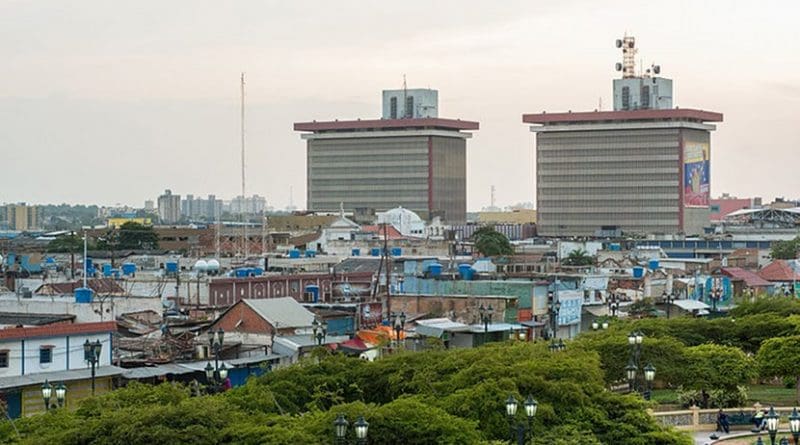US Sanctions On Venezuela Will Have Negative Consequences – OpEd
By Arab News
By Ellen R. Wald*
The people of Venezuela have been starving for years under the oppression of the socialist president Nicolas Maduro and his cadre of crony capitalist kleptocrats. The world has watched as Venezuelans physically suffered from the lack of food and healthcare, losing weight, fleeing to neighboring Colombia, eating pets and zoo animals and, in some cases, selling everything from their hair to their bodies themselves to survive. World leaders have commented in disapproval, particularly in the rest of South America, in Europe and in the US. Yet, until recently, the other nations of the world have tried little to alleviate Venezuela’s suffering.
Now, a growing group of nations has called for a new leader in Venezuela. They claim that Maduro’s recent re-election was illegitimate and that Juan Guaido, the president of the National Assembly, is the rightful president according to the Venezuelan constitution. At least 14 countries — including most of South America, much of Central America, the US, Canada and the UK — are now recognizing Guaido as the interim president. Meanwhile, they are generally calling for Maduro to resign and leave.
Massive protests against Maduro’s rule continue, as they have sporadically for several years. However, in the last month there has been news of some Venezuelan government representatives and military officials — especially those serving abroad — abandoning Maduro and his regime. There are some who believe that the end of the socialist and cruel regime is imminent. However, a note of caution is necessary: Historically, pundits and so-called experts are amazingly inaccurate when trying to forecast major historical events like a revolution.
Some of the countries that support Guaido now believe it is time to use geopolitical tools to actively encourage a turnover of power and help return Venezuela to the prosperous country it was before it turned down the path of socialism. The US is leading the way with sanctions. Washington had already implemented some sanctions against Maduro and his top aides, but last month it instituted more against Venezuela itself, particularly its oil industry.
The US and other countries have tried to provide humanitarian aid to Venezuela’s starving people, but Maduro has refused to allow it. He would seemingly prefer to watch the people of his country starve because of his party’s centralized control and mismanagement of the economy than to allow foreign capitalist systems to receive credit for helping. That means there may be little other countries can do to help Venezuela other than to make the socialist regime suffer.
Venezuela has the world’s largest oil reserves, larger even than those in the US, Russia or Saudi Arabia. Much of Venezuela’s oil is difficult and expensive to retrieve, but it is there. Unfortunately for the people of Venezuela, the socialist leaders — beginning under Maduro’s predecessor Hugo Chavez — have plundered the country’s once-diverse industries and tried to rely on oil alone to sustain the system. When oil prices dropped, starting at the end of 2014, Venezuela became a very poor country. Within a couple of years, lack of funds and poor management meant that even the national oil company, PDVSA, was falling apart. Today, Venezuela is only able to produce about 60 percent of the oil it is allotted under the current OPEC agreement.
The Venezuelan oil industry is the government’s only real source of revenue since it destroyed the rest of the economy, but even the oil industry is falling apart. The US government wants to precipitate that decline, which the White House seems to think is simple because Venezuela’s oil business is so closely tied to the US.
PDVSA has a subsidiary called Citgo, which owns refineries in the US and franchises gasoline stations across the US. Citgo refineries were importing a little more than half a million barrels of oil per day before the sanctions were announced. Moreover, the US was actually exporting gasoline and diluents to Venezuela so it could fuel itself.
The new sanctions allow Citgo and others in America to import Venezuelan oil, but the revenue will be held in escrow accounts that the Maduro regime cannot access. In other words, Venezuela can continue to provide crude oil to its business in the US, but Maduro’s government will never benefit from those transactions. There are still Venezuelan ships en route to the US, but soon enough Citgo will no longer be running. Maduro is not a fool, and there is no benefit for him to allow Citgo to run and enrich anyone but himself.
These sanctions will undoubtedly hurt Maduro and his government.
However, they will likely also have severe negative consequences for the
US, especially if Maduro holds on to power for months or even years.
Again, no one can predict how long Maduro will stay.
If Citgo stops its operations, almost 3,500 Americans will be out of
work. Moreover, the price of gasoline will rise. American-owned Citgo
franchises would have to rebrand and contract for new gasoline,
disrupting their operations and profits. Moreover, PDVSA uses proceeds
from Citgo to pay its debt to Russian-owned oil firm Rosneft, and a 49.9
percent stake in Citgo serves as collateral on that debt. The US could
refuse to allow Rosneft to take ownership of that portion of Citgo, but
it would prefer it if the situation did not arise.
Maduro must go to save the people of Venezuela, but the US should be careful not to hurt itself along the way.
• Ellen R. Wald, Ph.D. is a historian and author of “Saudi, Inc.” She is the president of Transversal Consulting and also teaches Middle East history and policy at Jacksonville University. Twitter: @EnergzdEconomy

